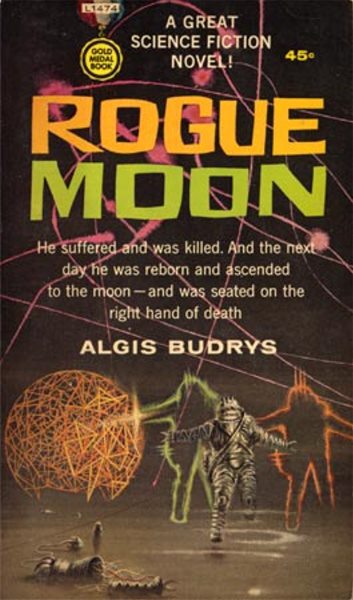
Sometimes, I just don't get it.
The December 1960 Fantasy and Science Fiction is almost completely devoted to one short novel, Rogue Moon, by Algis Budrys. I like Budrys, and F&SF is generally my favorite magazine, so I've been looking forward to this book since it was advertised last month.
To all accounts, it is a masterpiece (and by "to all accounts", I mean according to the buzz in the local science fiction circles). The premise is certainly exciting: there is an alien structure on the moon, an amorphous multi-dimensional thing, that kills all who enter it. To facilitate its exploration, the navy utilizes a matter transporter that disassembles one's molecules in one place and reconstructs them elsewhere. Volunteers are sent from Earth to their certain death to push a few more feet into the deadly extraterrestrial maze.
Of course, the transporter doesn't actually send anyone anywhere; it destroys the original and creates a copy that thinks it is the original. In fact, it's possible to make multiple copies of a person, and that is what is done: one copy goes to the moon to die, while the other stays on Earth to live on. It turns out that the two copies have a limited degree of telepathic contact for a short time, so the Earthbound copy can report on what his moonbound copy experiences.
The project's main hurdle is that it takes a special kind of person to experience one's own death and not go insane. How, indeed, to find such a person to unlock the riddles of the maze?
Sounds pretty intriguing, doesn't it? Sadly, Budrys hardly wrote this story. Instead, he gave us a florid, comically humorous soap opera with personalities as flat as the pages they are printed on. Here's the dramatis personae:
Edward Hawks: The project's director. A detached scientist, coldly resigned to his status as a murderer (both in terms of sending people to their death and the destruction of those who go through the transporter), desperate to understand how a person's existence can survive one's death.
Al Barton: A suicidal thrill-seeker. he's already lost a leg to his obsession for death-defying escapades–racing, mountain-climbing, parachuting. Setting records isn't enough for him; he's got to risk his life doing something no one else has done before. He spends most of his time attempting to prove his manliness to Hawks (in vain, as Hawks is too coldly impersonal to be impressed).
Vincent Connington: The project's director of personnel who introduces Hawks and Barton. A fellow whose brash arrogance is really just a facade that hides his love for…
Claire Parks: Barton's gorgeous girlfriend: She spends her entire "screen time" attempting to seduce Hawks and Connington and enrage Barton; she's afraid of men, you see, so she is always trying to manipulate them so she can keep her interactions in a safe, nonthreatening place.
Elizabeth Cummings: A wholesomely beautiful random stranger whom Hawks falls in love with. Her primary story function is to listen to Hawks' morose reflections on life and occasionally offer pithy observations.
Virtually no time is devoted to the actual exploration of the moon structure, and when the reader finally does get to see the jaunt through the maze, Budrys manages to make it the dullest part of the book.
Budrys does largely succeed at exploring the fascinating ramifications of "soul" duplication. What happens when there are two of you, when a moment ago, there was just one? And are the copies really you? Are you more than the sum of your memories? If not, is the communication of your memories to others, no matter how imperfectly, a kind of immortality (this is implied in the last line of the book, an admittedly powerful one.)
Which would have been great had it been less mawkishly presented, and the characters at all plausible. Budrys set out to make an insightful character study in the Sturgeon vein, depicting a disparate brood all struggling to find "The Meaning of Life." Instead, he ended up writing something more akin to Merril's The Tomorrow People: full of stilted dialogue, expository speeches, and precious little story. Fully 30 pages go by before we even get into the plot, which is a lot of time to waste in a 90 page novella.
I'm not sure how to rate Rogue Moon. Despite all the eye-rolling moments (quite literally), I did finish the short book in one sitting, which suggests there must have been something compelling about it. There were thought-provoking ideas. It was the execution which was disappointing, particularly for being by the normally excellent Budrys. I think, in the end, the book's prime failure is the introduction of so many interesting elements which are completely subordinated to the inferior, implausible psychological drama that Budrys, for some reason, was so hot to present.
Maybe the book, due to be released next month, will be better.
Two stars.
Stay tuned for the rest of the magazine!
